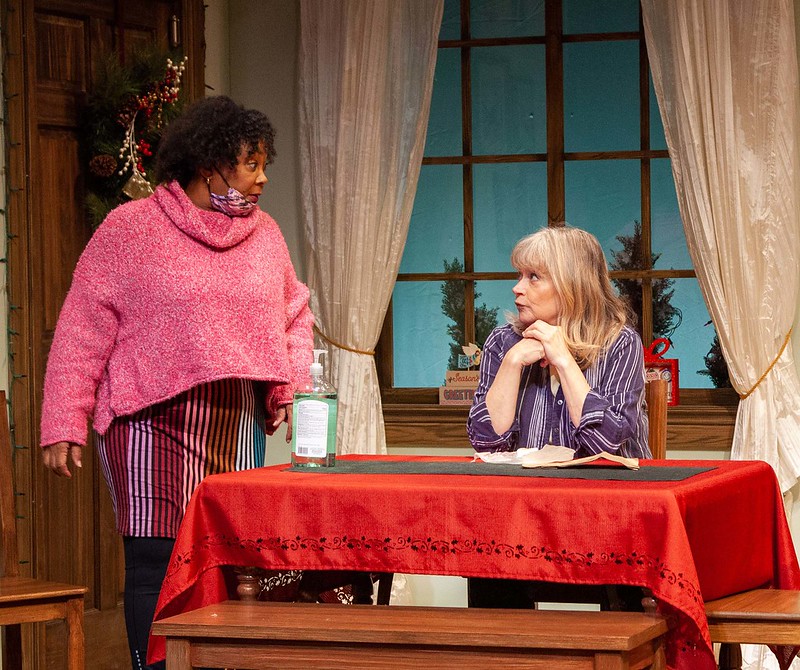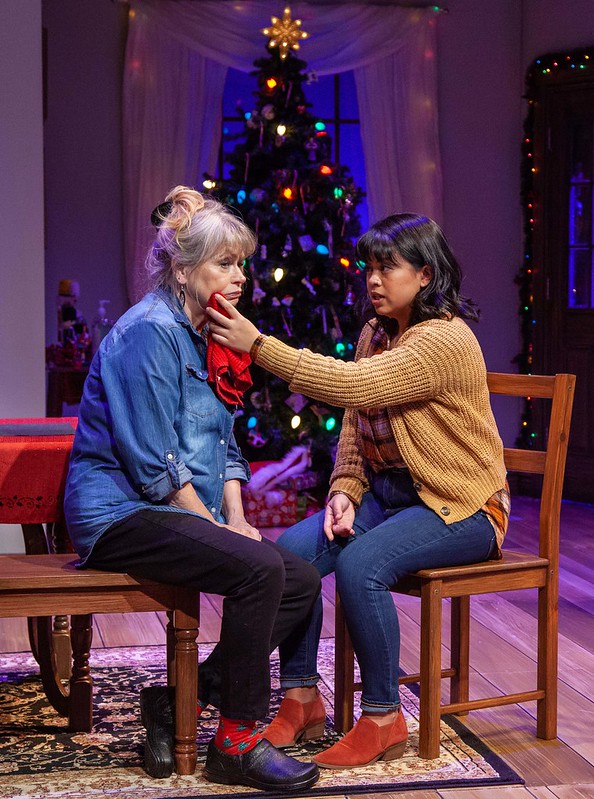
Rehearsal for “The Rise and Fall of Holly Fudge.” Photo by Meghan Moore/Megpix
Presented by Merrimack Repertory Theatre
By Trista Baldwin
Directed by Courtney Sale
Cast: Kristian Espiritu, Karen MacDonald, Eliza Simpson, Milicent Wright
Now – January 4, 2022
Video on Demand via Mandolin.com
MRT Playbill
MRT on Facebook
Age Recommendation: 14 and older. Some adult content/language.
Review by Kitty Drexel
Video-On-Demand — The copious productions of The Christmas Carol that come around every year are for mainstream Christmas celebrators. The Rise and Fall of Holly Fudge is a Christmas production for the rest of us. It’s intersectionality feminist. It passes the Bechdel Test. It’s under two hours, and you can drink rum-nog the entire time from your own home. Cheers!
‘Twas the night before Christmas and all through the house… Carol (New England darling Karen MacDonald) was stirring because her daughter Holly (Kristian Espiritu) was finally coming home to Brockton, Mass.! This year Holly is bringing her special friend Jordan (Eliza Martin Simpson). Worlds, politics, and identities collide when Holly reveals to Carol that Jordan is more than just her Jewish, progressive liberal friend from Portland.
Milicent Wright plays the online Zumba cueing, comestible baking, excellent listener and BFF neighbor Chris. I would take Zumba class with Chris/Millicent any day. She seems fun.

Milicent Wright and Karen MacDonald in MRT’s The Rise and Fall of Holly Fudge. Photo by MegPix/Meghan Moore.
The cast of Holly Fudge performs beautifully. Kristian Espiritu, Karen MacDonald, Eliza Simpson, and Milicent Wright lean into the comedy and the drama of their dialogue. The interactions between MacDonald and Espiritu make me miss my Mom. The fight scene between MacDonald and Wright is hilarious and realistic.
It looks like director Courtney Sale gave the cast the freedom they needed to explore their roles and to stay safe during rehearsals and performances. I greatly appreciate that the roles of Holly and Jordan aren’t performative. We see their attraction for each other through affectionate their hand-holding, kisses, and just enough necking on the couch. We see Carol recoil from their publicly-appropriate mutual attraction.
I saw a lot of my own family’s dynamics in The Rise and Fall of Holly Fudge. I identify with Holly and Jordan. My own extended family refers to my wife as my “friend” in front of their kids; we were once introduced to the parish priest by my mother as my mother’s two daughters after Christmas Eve mass; we celebrate Yule on the solstice but appreciate christianity’s appropriation of pagan symbols.
Watching this show got real for my family. The rage, sadness, and joy were overwhelming. In that way, The Rise and Fall of Holly Fudge is just like an actual family holiday event. I cried about it. Drank some rum about it. Then I carried on when I was ready. By the end, I was much happier for watching than when I was when I started.
The mainstream holidays can be difficult. There’s something about capitalism meeting the birth of Jesus that makes blatant ignorance, unbridled hate, and the mass discomfort of non-christians acceptable. We’re told that, in the name of Christmas, we must put aside our differences, and practice love in god’s name.
Do we? Do we really? Because there’s a lot of shushing in the name of familial peace: Don’t correct Grandpa about The Gays or #BlackLivesMatter. Don’t tell your nieces that Santa doesn’t visit their Jewish cousins. Definitely don’t interrupt Aunt Marjorie when she blathers on about Antifa, vaccines, or her veganism. It’s Christmas.

Karen MacDonald and Kristian Espiritu in MRT’s The Rise and Fall of Holly Fudge. Photo by MegPix/Meghan Moore.
Playwright Trista Baldwin gets it. She sees that it’s possible to love someone(s) unconditionally and yet feel unseen by that person. Baldwin understands that sometimes it’s more important to spend time with the toxic family clinging to erroneous understandings of who you are than it is to be without them.
Baldwin also understands that in a perfect world, like in a play, toxic family members might salvage their busted relationships with an inkling of introspection into the hurt they are causing by their insecurities and ignorance. A mother must accept a daughter as she is, not for who Mom et al. think she should be. Expectations based on false premises kill love.
At it’s core, Holly Fudge is a love triangle between a mother, a daughter and the daughter’s partner. Carol and Jordan are vying for prominence in Holly’s life. Holly loves them both. All three doubt that the other relationship will survive Christmas. They learn that there’s room in all of their lives for many kinds of love.
The Rise and Fall of Holly Fudge streamed production was recorded with a live audience. The editing is good: it is shot from above the audience with a close-up of the stage, sometimes it pans out to a wider shot to capture broad staging but, usually, the lens stays close. The recording captures audience noise such as clapping and a sneeze. The noises don’t interfere with the performance.
The run time is 150 minutes, including 1 brief intermission, bows, and credits. Streaming via Mandolin.com allows a viewer to stop and start at one’s leisure within the rental period. The viewer is not beholden to a single sitting to view the performance. Should life (a cat’s meowing, familial obligation, or, say, a microwave’s dinging) interrupt, one can rewind, pause or fast-forward as needed.
